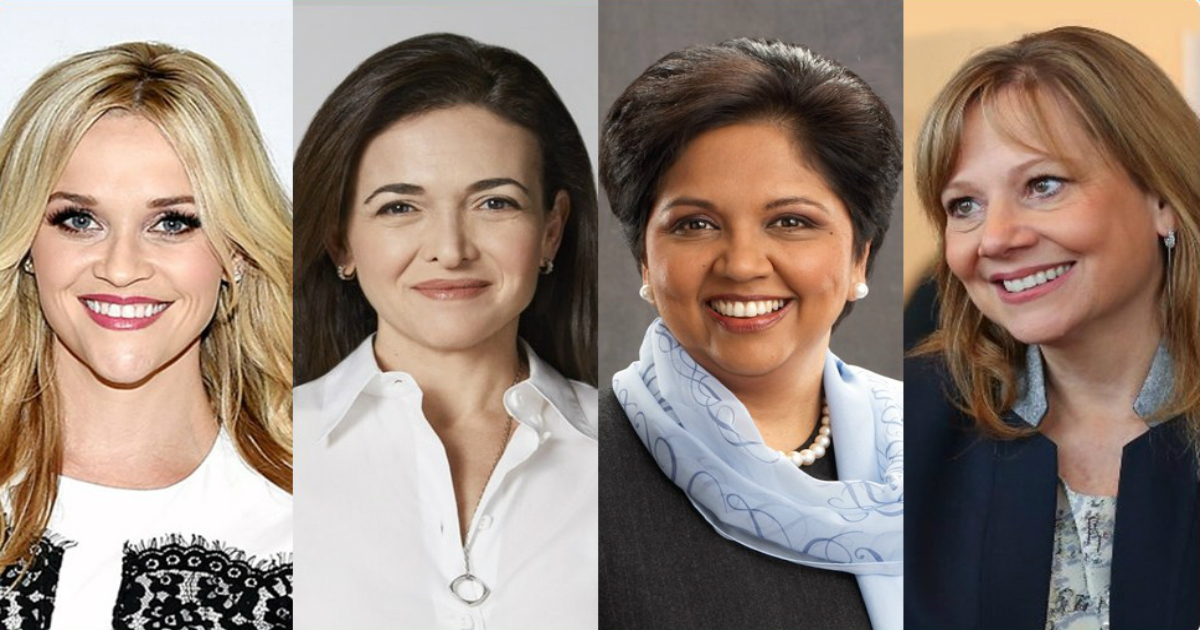Entrepreneur Stories
The Most Powerful Women of 2017

The multinational business magazine published and owned by Times Inc., Fortune, has released the 2017 list of the most powerful women in the world. This year, the list comprises of 26 CEOs from around the globe who control close to $ 1.1 trillion in market capitalization. The full list includes 51 successful women including nine women from the tech industry.

The Chief Executive Officer of General Motors, Mary Barra topped the list for the third consecutive year. She was instrumental in beating Elon Musk’s Tesla Model 3’s release in the market with the Chevrolet Bolt EV which even boasted of a better battery.

Indra Nooyi, who has led PepsiCo as the CEO and president for a decade, took the second spot on the list. She also played a significant role in the acquisition of Tropicana and the company’s merger with Quaker Oats. Nooyi was featured 18 times in the 20 years the Fortune list of most powerful women has been published.
Marillyn Hewson, the Chairwoman, President and Chief Executive Officer of Lockheed Martin along with Abigail Johnson, the Chairman and CEO of Fidelity Investments and Sheryl Sandberg, the COO of Facebook take the 3rd, 4th and 5th spots on the list respectively.

Sandberg was instrumental in Facebook’s blockbuster 2016 ad revenue growth, which increased to 57% or over $ 26.9 billion and propelled the company to new heights. Her book titled Option B, which deals with grief over the loss of her husband, also topped the best seller list this year.
Seven newcomers made it to the list this year, including Hollywood actress Reese Witherspoon. Chief Executive Officer of the Pacific Gas and Electric Company, Geisha Williams, became the highest ranking newcomer on the list. She is also the first Latin woman to run a Fortune 500 company and is currently ranked at 19. Boeing’s Defense, Space and Security CEO, Leanne Caret, Staples CEO Shira Goodman, Reinsurance Group of America CEO Anna Manning, Hershey CEO Michele Buck, Ulta Beauty CEO Mary Dillon and Mattel CEO Margo Georgiadis are the other newest editions to the list.
The number of female chief executive officers in the Fortune 500 companies hit a record low in 2017. Only 6% of the total 500 or 37 women hold the top managerial positions in reputed organizations around the world. The number of women in the leading roles in tech companies also brings to light the uncomfortable realities of a big gender gap in one of the fastest growing industries in the world.
According to Fortune, four main criteria are looked at while making the list. It includes the size and importance of the woman’s business in the global economy, the health and direction of the business, the arc of the woman’s career and social and cultural influences.
Entrepreneur Stories
Zupee Bolsters Short-Video Play with Vertical TV Acquisition Under INR 40 Cr

Delhi NCR-based gaming startup Zupee has acquired Mumbai-based microdrama platform Vertical TV in a deal valued under INR 40 Cr. This move strengthens Zupee Studio, its short-video arm launched in September 2025, by integrating Vertical TV’s expertise in bite-sized dramas like romance and thrillers.
Facing challenges from India’s 2025 real-money gaming ban, Zupee valued at $1 Bn after raising $120 Mn has pivoted to non-gaming content, including recent layoffs of 40% of its workforce. The acquisition builds on its November 2025 purchase of Australian AI firm Nucanon for interactive storytelling, targeting its 200 Mn+ users with engaging, mobile-first formats.
This deal underscores the rising microdrama trend in India, helping Zupee diversify amid regulatory pressures and compete in the short-video space dominated by quick, shareable content for on-the-go audiences.
Videos
T.N. Seshan: The Fearless Reformer Who Redefined Indian Democracy

T.N. Seshan’s name stands tall in India’s history as the man who transformed the nation’s electoral system with extraordinary courage and integrity. Born in 1932 in Kerala, Seshan grew up with values of discipline, education, and service to the nation — virtues that shaped his illustrious journey. From his early brilliance at Madras Christian College to his advanced studies in public administration at Harvard University, Seshan’s path reflected rare determination and intellect. Joining the Indian Administrative Service in 1955, he built a reputation as a no‑nonsense officer committed to efficiency and honesty, serving in key roles such as Secretary of Defense and overseeing vital national programs.
As the Chief Election Commissioner of India in 1990, T.N. Seshan sparked a new era of electoral integrity. In a system once marred by corruption, violence, and malpractice, Seshan brought order, fear, and respect through his groundbreaking reforms. He introduced voter ID cards, imposed strict spending limits on campaigns, and insisted on transparency at every level of the election process. Despite criticism from political circles that labeled him dictatorial, his relentless pursuit of fairness empowered every citizen to vote fearlessly. Under his leadership, the Election Commission became a symbol of strength and integrity in Indian democracy.
Seshan’s passing in November 2019 marked the end of an era, but his message continues to resonate across generations. Leaders from every corner of the country mourned the loss of the man who restored faith in free and fair elections. His enduring legacy reminds us that true leadership lies not in wielding power, but in serving people with honesty, courage, and conviction. T.N. Seshan’s life remains a timeless inspiration a reminder that democracy thrives only when its citizens are vigilant, responsible, and fearless.
Entrepreneur Stories
Indian Man Quits JPMorgan, Takes 70% Pay Cut to Launch $6 Million Startup

Leaving behind a high-paying job at JPMorgan, an Indian entrepreneur embraced a 70% salary cut to pursue true purpose and passion in the startup world. Disenchanted with what he described as a “robotic” corporate routine, he sought meaningful work that made a real impact. This pivotal decision marked the beginning of his new journey, one focused on value creation rather than titles and corporate perks.
Powered by resilience and fresh perspective, the entrepreneur launched his own startup, prioritizing innovation and hands-on solutions. The road was challenging, but his vision resonated with the market: the startup quickly gained traction and raised $6 million—an impressive acknowledgement of its potential in a competitive landscape. Every hard lesson from early setbacks and bootstrapping paid off in real customer growth and investor confidence.
Today, his journey stands as an inspiring example for professionals seeking authentic success outside the corporate grind. By trading comfort for creative freedom, he grew a venture that solves important problems, generates jobs, and builds wealth beyond just salary. For ambitious founders, his story highlights the power of risk-taking, adaptability, and relentless focus on impact in India’s thriving startup ecosystem.













GO88
November 6, 2025 at 1:49 am
Tham gia cộng đồng game thủ tại Go88 để trải nghiệm các trò chơi bài, poker phổ biến nhất hiện nay.
站群程序
November 6, 2025 at 7:47 pm
采用高效谷歌站群策略,快速提升网站在搜索引擎中的可见性与权重。谷歌站群
谷歌蜘蛛池
November 10, 2025 at 12:50 am
利用强大的谷歌蜘蛛池技术,大幅提升网站收录效率与页面抓取频率。谷歌蜘蛛池
J88
November 10, 2025 at 11:44 pm
Đến với J88, bạn sẽ được trải nghiệm dịch vụ cá cược chuyên nghiệp cùng hàng ngàn sự kiện khuyến mãi độc quyền.
MM88
November 20, 2025 at 9:28 pm
Khám phá thế giới giải trí trực tuyến đỉnh cao tại MM88, nơi mang đến những trải nghiệm cá cược thể thao và casino sống động.
MM88
November 22, 2025 at 2:31 pm
Với giao diện mượt mà và ưu đãi hấp dẫn, MM88 là lựa chọn lý tưởng cho các tín đồ giải trí trực tuyến.
Kuwin
November 22, 2025 at 3:36 pm
kuwin sở hữu kho game đa dạng từ slot đến trò chơi bài đổi thưởng, mang đến cho bạn những giây phút giải trí tuyệt vời.
iwin
November 29, 2025 at 9:06 pm
iwin – nền tảng game bài đổi thưởng uy tín, nơi bạn có thể thử vận may và tận hưởng nhiều tựa game hấp